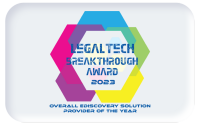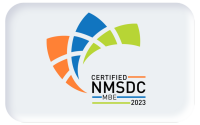I was asked this week what my least favorite eDiscovery buzzword was and without hesitation I responded “AI”. AI, as in, artificial intelligence, is one of those terms that makes me cringe whenever I hear it spoken in terms of the legal industry.
 Supervised and unsupervised machine learning, in my life, are very common tools. I gave up cable a few years back and rely solely on Hulu, Amazon Prime and Netflix for my binge-watching pleasure. Because of this, I have come to rely on those apps to make recommendations for other shows or movies I may want to watch. More often than not, the recommendation engines are right and when they aren’t, I take the time to go in and change the rating, so that I am teaching them what to recommend to me. No one calls this AI.
Supervised and unsupervised machine learning, in my life, are very common tools. I gave up cable a few years back and rely solely on Hulu, Amazon Prime and Netflix for my binge-watching pleasure. Because of this, I have come to rely on those apps to make recommendations for other shows or movies I may want to watch. More often than not, the recommendation engines are right and when they aren’t, I take the time to go in and change the rating, so that I am teaching them what to recommend to me. No one calls this AI.
I use Spotify Radio now or Google music, almost exclusively. The first thing I do when I get into my car is make sure my Bluetooth is connected. I choose an artist I want to listen to, or a song, I flip to radio and Spotify or GM play that song and others like it, that I may like. Along the way I skip songs I don’t like and I listen to the ones I do like. I have found many new bands to listen to because of these recommendation engines. No one calls that AI.
I live in the woods in Connecticut and finding restaurants that deliver can be hard. I rely on Grubub and Vroom to bring me tasty food that I am too lazy to cook. In both apps, when I first log in, they suggest restaurants that I may want to order from, based on my previous orders. Grubhub knows I love Thai food. Vroom knows that my kids love sausage, onion and pepper pizza. Both Grubhub and Vroom are also nice enough to suggest add-ons I may want to order, in addition to my orders, again based on my preferences and the preferences of other people, who liked the same food. No one calls that AI.
And yet, I tell someone in legal that I want to use a recommendation engine to suggest Responsive or Not Responsive documents, and the word ‘AI’ flies out of their mouth before I can even finish the sentence, whether they want to use the engine or not.
I also think ‘artificial intelligence’ is a misnomer. It’s not artificial, its true intelligence. If you use the definition that intelligence is an ‘aptitude in grasping truths, relationships, facts, meanings, etc.’ (provided by dictionary.com), then the type of AI we use in the legal world, predictive analytics, is real intelligence that we are being given by our systems to help us make decisions. AI in the eDiscovery realm is information gathering and improved presentation, pure and simple. We may choose to make automated decisions on that gathered info, but in the end we have access to all the decisions, we can inform the decisions and QC/validate however we see fit. Not looking at documents is a workflow decisions, not AI.
When asked about the buzzword, my response was that when people hear AI, they think Skynet or unemployment or they think it’s going to be super confusing. But no one thinks Skynet when they log into Netflix. No one thinks unemployment when they use GrubHub. No one thinks Spotify is really confusing to use. I think we, in the legal industry, need to start realizing how embedded AI is already in our everyday lives, how much we take advantage of it in our everyday lives and really start, as a community, to push for the embedding of AI into our processes as well. AI will not make bad decisions, AI will not put us all out of work (although it may arguably change the way we work and our roles) and AI does not have to confuse us. And maybe we should stop saying AI all together, unless we are talking the movie (Spielberg, 2001) or actual Skynet-conquer-humanity type stuff. Let’s say Analytics instead of artificial intelligence or technology assistance or e-Intelligence or something other than AI.
When asked what my favorite eDiscovery buzzword is I said eDisco. It’s funny to think of the era of disco and electronic discovery at the same time. Maybe time to start adding disco balls to review centers and server rooms?
Yes!





